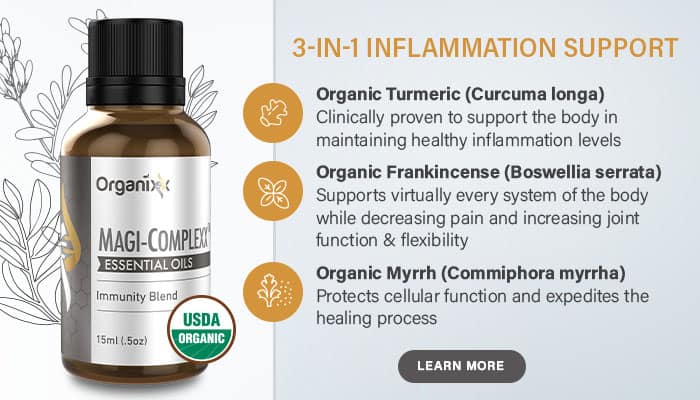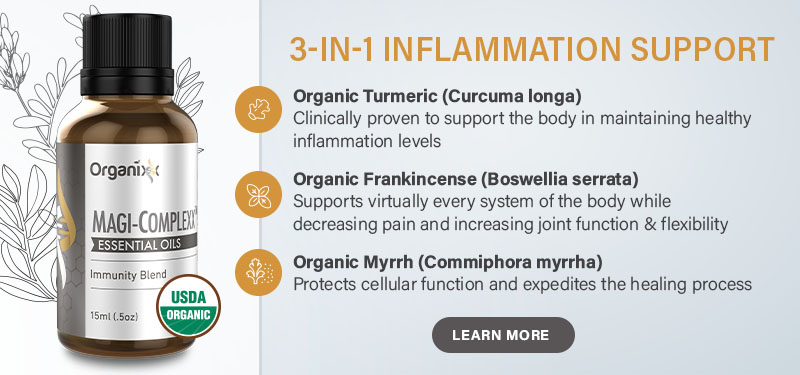Video Transcript:
I want to share with you five really impactful and very easy tips to help you get to sleep in the healthiest and most optimized way. This answers the question of a lot of you viewers and consumers here at Organixx who are having a challenge with getting your body and your brain to calm down so that you can get optimal sleep.
And these five tips are going to be very impactful for individuals of all ages. So if you have children that might have this challenge where they’re not slowing down or their body seems like they’re awake, but maybe they’re a little grumpy and tired, these tips can also be applicable for our younger kids, as well as preteens and teens and young adults.
Avoid Blue Light Before Bed
All right. So kicking off with number one, this is really simple, and it is avoiding blue lights like your phone, your TVs, or any of the electronics that you might be using or working on within two hours of bedtime. And I recommend getting these blue light blocking glasses. And so these are a non-prescription glasses, these happen to be one of I think five pairs that I have. I have them everywhere.
And what these allow you to do, if you do have to work or you’re checking your phone, or even if you prefer to watch TV at night, when you wear these, it minimizes the impact of the blue light. And the blue light, these blocking glasses, they have these for kids as well, so if kids are using iPads or they’re working on computers for homework, have them put on their glasses from 6:00 PM until bedtime. So by wearing blue light blocking glasses, or even putting a little screen on your computer, they have those you can grab easily on Amazon. By wearing these, it helps to minimize the impact of the TV or the phone or the iPad light in affecting your sleep cycle.
And so the first thing is that blocking process is really stopping the impact of blue light that might keep you awake longer than what you prefer. So again, 6:00 PM and on wear these. These are non-prescription, super easy to grab, you can find these at your pharmacies, online, but really great – the blue light blocking glasses.
Set Your Thermostat for Sleep
Now, the second thing is to set your temperature. And I love to automate this function because it’s super easy. But you want to be sleeping in ideally the low seventies, high sixties. That ideal temperature range for optimal sleep is 68 to 72. Now, this depends on your budget, where you live, humidity levels, all different factors. But that temperature we find is ideal for good restorative, rejuvenative sleep. And it’s a part of that getting to sleep better when you’re under your blankets and you’re feeling cozy, it signals to the brain to go to sleep.
Supplementation Assistance
Now, third is an assortment of supplementation. Sometimes we need assistance, and the assistance comes in the way of assorted herbals and minerals that can support your body’s natural downgrading and getting into the sleep cycle. So we have that circadian rhythm, basically, it’s the day and night rhythm. We want to be ideally most awake in the morning. And we start to see the circadian rhythm drop, and it’s at its lowest point right before we are going to bed and engaging in sleep.
Magnesium
So, I first reach for Organixx Magnesium 7. Magnesium, especially now we have the seven assorted magnesium types and forms, they’re going to target different body systems. And magnesium has been clinically studied to help calm our central nervous system and eases the whole sleep cycle.
Magnesium is great if individuals find that they have insomnia or just that difficulty getting to sleep, magnesium is great. So again, that’s the Magnesium 7 here at Organixx.
Herbals and Teas
Now, sometimes we need some herbals and I love to incorporate herbals, very central-nervous-system-calming herbals, like passionflower and valerian. You can find these in teas. And I also like to add in a holy basil – that is an adaptogenic stress-reducing, cortisol-lowering adaptogen. And I grabbed this from my medicine cabinet. I drink tea a lot. I’m a tea lover and I have different teas that I drink throughout the day.
In the later part of the evening, after dinner, I will brew up a toasty sleep tea, I’ll brew up a valerian sleepy-time tea, and also just a passionflower tea. Sometimes you can get loose-leaf passionflower at your bulk natural stores and online. So, you can blend those also, you can make your own kind of sleepy-time tea combo.
But those are very impactful for just calming the system, helping slow things down, drop that circadian rhythm so that the body’s entering into that lower phase circadian rhythm so that we have the sleep cycle kicking off in the right form.
This is critical. I’m going to share additional tips in future video content, where I’m going to share with you how to stay asleep fully. So not wake up during the middle of the night. And how to wake up refreshed. But the kicking off, getting your body and the central nervous system balanced and lowered is really critical.
Melatonin
Now, often I get asked, “Hey, Dr. Melissa, what are your thoughts about melatonin?” Because that often gets billed as a neurotransmitter-focused supplement that can help balance sleep. And even GABA falls into that category. I recommend before using melatonin or GABA, that you’re going to often find in some natural sleep aids, I recommend having your neurotransmitters tested. Because too much melatonin actually will keep you awake and it won’t help you sleep solidly.
So, melatonin is one of those things that I use sparingly, I use it specifically, I want to have more clinical data, IE labs, to understand where your values are. Because sometimes we have to trim your melatonin or elevate the balance of other neurotransmitters to ease that increase in melatonin that might be causing your brain to race before you go to bed.
Bach Flower Therapy
Now, speaking of brain racing, number four, I love to incorporate this really amazing option. So, tip number four is this amazing natural therapeutic that involves flowers. And this might sound a little like, okay, what in the world are flowers going to have to do with sleeping better and actually getting to sleep easily?
I’m going to share with you a therapy that a psychiatrist analyzed in a psychiatric hospital a hundred years ago, that when psychiatric patients were brought out into the garden, if they were parked, their chairs or their wheelchairs, were parked near certain plants or trees, that they started to have some emotional relief. And they started to see and notice changes in their outlook. And even patients rebounded from whatever diagnosis or mental illness they had.
Well, fast forward to lots of research in identifying the different flowers that are associated with emotional challenges or really our emotions connect to certain flowers. And so what this therapy is, it’s called Bach flower remedies or Bach flower therapy. And it is incorporating specific flowers that can ease stress, can calm the mind. This is really, really impactful.
And what I recommend for any of my patients that are going to usually tell me, “Dr. Melissa, I’m always physically tired, but my brain is wired. I’m thinking about my day, I’m rehashing meetings, or oh, I could have said whatever with so and so, or I’m running through the list”, and your brain is awake, but your body’s really ready to go to sleep. But the brain is wired, it’s alert.
Bach flowers, so I’m going to share with you, it comes in an assortment of remedy forms. This happens to be a pastille. I have one I can show you, it’s a little like suck on, and you put it in your mouth and suck on it like you would a lozenge. They also have sprays, they also have drops. They have non-alcoholic drops for kids. They even have this for pets. And I’m going to share with you … There are five particular flower types that are in the overall remedy. This is going to categorically address stress, emotional trauma, grief. It addresses the general state of folks that have that mind that’s awake.
And how we use Bach flower remedies is to begin taking either a few sprays or a few drops an hour before the desired bedtime. And what my patients experience instantaneously is a releasing of that mind going, and it just calms down the mind so that you’re not thinking about the list. You’re not thinking about the meeting tomorrow. You’re not thinking about the meetings from today or the conversation with your spouse or your kids. Those all go away. And the emotions just root, so that the body can sleep. It’s by far one of my most spectacular remedies and resources for folks that have a hard time getting to sleep. And it’s the brain that’s going. It’s not always the body that’s a challenge, but it’s the brain. And it’s the thinking, the constant thought pattern.
Your Sleep Environment
Okay. So, last and final, I want to share with you, is really setting the right tone for the sleep environment. I call this the right bedroom environment. Meaning, is your bedroom space ideal for optimal sleep? And there’s several steps to this. But I want you to assess, and even some of my patients, I’m having them take pictures from different angles of their bedroom. And I want to make sure that we have no clutter in the bedroom. I want to make sure there’s nothing being packed or stuffed underneath the bed. I want to make sure that their beds are made. When they’re getting into bed, it’s really nice clean, crisp sheets, because you’re not having to worry about a messed up bed.
But more importantly, I want to make sure we don’t have a TV in the bedroom. I want to make sure that the bed itself is comfortable and conducive for the right sleep environment. Meaning, how do your sheets feel? Are they the right thread count? Are they breathable? Are you under enough or too many blankets? What’s your pillow like, are you dealing with a pillow that might be causing you to wake up or just cause you discomfort?
Weighted Blankets
I also like to have patients who need that extra support to getting them to go to sleep, I incorporate a weighted blanket. This really targets folks that have anxiety, just underlying anxiety and even depression. Weighted blankets have a ton of research. They come in different weights and sizes. They have little younger kiddo ones to teens and adult versions. But my weighted blanket, it’s 15 pounds. Brian calls it my iron curtain because I have it just on my side. And it is glorious. It just feels like I’m a snug little bug in my bed. And it just is like … I bring it up to here and it just feels like you’re being hugged.
That action of the weight on the body is a sensory signaling. It creates sensory signals that literally calms the mind, calms the body. We have hormones that get produced, happy, healthy, good sleep-inducing hormones that come from the activity of being in a weighted blanket.
Now, if any of you are parents, think about when you brought your newborn home from the hospital. The effort was to create that fourth trimester where you really swaddled them and have them wrapped up where they felt like they were still inside their mother’s uterus. Weighted blankets take us back to that primal state as humans. And it’s very effective for getting somebody to sleep better and faster. So that is a game changer, total game changer.
Sleep Clothing
The other thing is I want to look at what is the sleep clothing that you’re wearing. Are you wearing breathable clothing? For some of my patients that might experience night sweats, I want to make sure we’re wearing wicking, bamboo-related night clothing and nightwear – shirts, tank tops, camis for ladies, and pants for men. But I want to make sure that sweat is not going to cause you grief in getting to sleep because that can be a big factor. Get into bed, and all of a sudden you’re sweating. You’re not going to be comfortable. Even if that temperature is 68 degrees in your bedroom.
White Noise & Air Purifiers
The other thing is to deploy white noise via an air filter. This is one of those things where I’m using this tool as a way to create a space where your body is not being bombarded by allergens, dust. As well as enhances that whole airflow so that we’re not maximizing or you’re not experiencing inflammation that will register when you wake up, puffy eyes, gunkiness in your nose.
So, that’s really important to look at maybe adding a white noise machine. That’s another way, the brain just zeros in on it and just lulls you into a sleep. It’s almost like when babies and young toddlers are driving around in a car, I mean, it’s like magic. That was actually what Gabriel … we’d have to drive him around to have him take a nap. And so white noise is highly effective now he’s older. But adults can benefit from that white noise.
And I just like to blend that where, let’s have your air filter, a good clean HEPA high-quality air filter. Maybe even with a little UV, have that function as your white noise machine.
Himalayan Salt Lamps & Green Plants
And then last and final environmental-wise. I want to make sure we are also emitting good negative ions into your air via a Himalayan salt lamp, as well as maybe having a green plant like a lily. I love lilies in the bedroom. They’re very oxygenating and they clean the air. That’s really important though, just have that nice, clean, crisp environment where it’s just soothing.
Essential Oils
You can even incorporate essential oils. Here at Organixx, we have really wonderful lavender. I love lavender and frankincense, you put those two together on a little cotton ball. And I will stick them on the Shakra points. So, I’ll do one where your hips might be, mid-back, up here around the neck, and then even I’ll tuck one in the pillow. Frankincense is very grounding, it’ll bring down your energy and it’ll root you into that whole circadian rhythm. Lavender is just so calming.
So, you can incorporate sight, sense, smells, just that feeling of comfort, great sheets, an excellent pillow, weighted blanket, cool temperatures – very, very impactful for helping you get to sleep better.
I hope these five tips were helpful. Let us know how you do with them. And if you have any other challenges you want us to address with the sleep cycle. And make sure you subscribe and follow us along here. As well as read your emails … As well as watch future emails coming out with additional ways to help you sleep better.
Magnesium deficiency is linked to stress, diabetes, heart disease, osteoporosis, chronic fatigue syndrome, depression, anxiety, trouble sleeping, sore muscles, migraines, and many more debilitating health conditions.
If your body needs magnesium, you want the most beneficial kind your body can actually absorb. Organixx Magnesium 7 gives you seven (7) of the very best, most bioavailable types of elemental magnesium available.

The lavender plant is truly an amazing sight to see with its petite purple flowers that cap slender stalks jutting forth in every direction from its bushy center. But the dazzling display of beauty it bestows to its beholders is only the tip of the iceberg as to the true essence of this beloved botanical.
With a calming, sweet-smelling aroma and an extensive history of therapeutic lavender oil uses, it’s no wonder that lavender still ranks among the most popular medicinal herbs in the world.
For more than 2,500 years, in fact, people have been using lavender both medicinally and religiously to make everything from perfumes to holy anointing oils, to healing salves and ointments.
In ancient Egypt, lavender oil was commonly used to embalm the dead. In ancient Rome, it was used to freshen the air and scent bath water, as well as to liven up food. Many biblical scholars even suggest that Saint Mary used it to anoint Christ with her hair – lavender likely being the costly perfume referenced in John 12:3 as nard, or spikenard.
All throughout the ages, lavender has held a special place in the collective heart of mankind. It possesses an almost sacred nature, after all, being set apart from most other plants in terms of the many unique ways in which it interacts with the senses. Beyond just its pleasant bouquet, lavender is said to impact the body on many different levels – not only physically, but also emotionally and even spiritually.
The Harmonious Balancing Properties of Lavender Oil
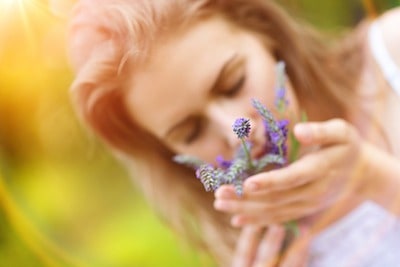 Your being isn’t just your physical body, after all. It’s also your mind and your soul. And if you examine the historical accounts, lavender seems to touch all three pieces of this complex human puzzle. It helps to quiet what goes on inside the head while balancing everything else.
Your being isn’t just your physical body, after all. It’s also your mind and your soul. And if you examine the historical accounts, lavender seems to touch all three pieces of this complex human puzzle. It helps to quiet what goes on inside the head while balancing everything else.
You might just say that lavender is powerfully holistic, with lavender oil being one of the most coveted distillates on the planet for imparting full-spectrum health support.
Lavender essential oil has been studied for its positive effects on a wide range of mood and sleep-related conditions including:
- Stress
- Anxiety
- Depression
- PTSD
- Insomnia
- Headaches
- Migraines
Lavender Essential Oil for Stress & Anxiety
The use of lavender essential oil to help mitigate feelings of stress and anxiety is well-established both empirically and scientifically. A paper published in the International Journal of Psychiatry in Clinical Practice found that individuals who took daily capsules filled with 80 milligrams of lavender essential oil experienced pronounced relief from these and many other symptoms, including depression.
Lavender has repeatedly been shown to help improve mood and sleep quality while causing no negative side effects [1].
The reported balancing effects of lavender oil extend even further, as demonstrated with another paper published in the journal Evidence-Based Complementary and Alternative Medicine suggesting powerful efficacy with regards to the nervous system.
In evaluating a cohort of both animal and human trials where it was thoroughly tested as a potential treatment, researchers from Europe and the Middle East concluded that lavender oil exhibits strong anxiolytic (anxiety-reducing), mood-stabilizing, sedative, analgesic, anti-convulsive, and neuroprotective properties ][2].
Many individuals who suffer from depression and anxiety symptoms find relief when using lavender oil as aromatherapy. High-risk postpartum women, one study found, tend to respond well to the use of lavender oil, which can help minimize or eliminate symptoms in as little as four weeks [3].
Can Lavender Assist with PTSD?
Lavender oil can provide similar benefits for people with post-traumatic stress disorder (PTSD), as evidenced in another study looking at its effects specifically on mood. Researchers found that taking just 80 mg of lavender oil per day resulted in a 32.7% reduction in depression symptoms, as well as dramatic improvements in both mood and sleep quality [4].
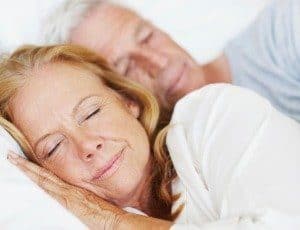 Sleep Better with Lavender
Sleep Better with Lavender
The findings of a similar study published in the Journal of Alternative & Complementary Medicine support this as well, having found that individuals with insomnia slept 60% better when they started using lavender oil [5].
Lavender Can Help Soothe Headaches
Lavender oil is also incredibly soothing against headaches, according to another study published in the European Journal of Neurology – headaches, and especially migraines, being a common cause of sleep disruption for many people [6].
What’s in Lavender Essential Oil?
The primary active constituents in lavender oil, which include linalool, linalyl acetate, 1,8-cineole B-ocimene, terpinen-4-ol, and camphor, lend to all of this pronounced biological activity. These compounds vary in amount and ratio, of course, depending on the type of lavender oil used.
There happen to be more than 30 different species of lavender that we currently know of, with many dozen more subspecies and hundreds of hybrids and selected cultivars.
While all lavender may have benefits, the type of lavender that has been most researched and is regarded as the most therapeutic type of lavender is Lavandula angustifolia.
Lavender Essential Oil for Skin Support
Many of the lavender oil uses mentioned above tend to be aromatherapeutic in nature. But this precious substance can also be applied topically to support other areas of the body, not the least of which include the skin.
With pronounced antimicrobial properties that are highlighted in nearly 100 scientific studies, lavender oil is often used to help accelerate the healing of abrasions, burns, cuts, and other skin wounds.
This common way of using lavender oil is perhaps the biggest reason why essential oils in general are even on the natural medicine radar today. It was French chemist René-Maurice Gattefossé’s use of lavender oil back in 1928 to heal a burn on his hand that propelled the idea of using essential oils therapeutically into the modern age.
This event is believed to be the primary reason why essential oils are growing in popularity today.
Lavender Fights Bacteria & Viruses
With that in mind, consider that we now know from further scientific inquiry since the time of Gattefossé that lavender oil may also help to prevent infections stemming from bacteria, viruses, and fungi.
Especially when combined with other antimicrobial essential oils such as clove oil, cinnamon, and tea tree, studies show that lavender oil has the pronounced ability to combat even hard-to-fight infections such as Staphylococcus aureus and Candida albicans [7].
When mixed with a carrier oil such as coconut, olive, or jojoba, lavender oil can also help to soothe dry, chapped, or sunburned skin. Some people say that it also helps minimize the appearance of sunspots and aging. Lavender oil is also commonly used to help stop allergic reactions from occurring on the skin, such as those stemming from exposure to poison ivy or stinging nettle.
Better Than Vitamin C? The Antioxidant Power of Lavender Oil
Many people don’t know this, but lavender oil is also a powerful antioxidant. With an antioxidant potential that’s stronger than even vitamin C, lavender can be considered an antioxidant “super hero” and is actually one of the most powerful antioxidants in existence.
Lavender’s constituents help the body to produce more antioxidant enzymes like glutathione (aka the “master antioxidant”), catalase, and superoxide dismutase (SOD), which it needs to prevent free radicals from causing oxidative damage within its many complex parts.
In an animal study published in the journal Phytomedicine, Romanian 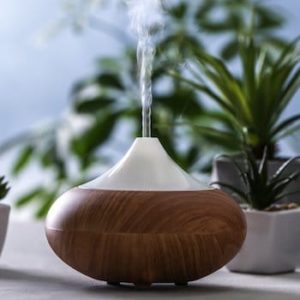 scientists discovered that vaporizing lavender oil for just one hour every day for seven days can help protect cells against free radical damage.
scientists discovered that vaporizing lavender oil for just one hour every day for seven days can help protect cells against free radical damage.
In this same rat study, researchers reported that inhaling the vapor of lavender oil every day for just 60 minutes helped to prevent the type of oxidative stress associated with Alzheimer’s disease and other forms of dementia [8].
Chinese researchers came to another fascinating conclusion in an unrelated but similar mouse study, determining that the antioxidant potential of lavender’s constituents are evident in the body after just 22 hours of the oil’s use [9].
There’s even animal research findings emerging to suggest that lavender oil could be beneficial in addressing the various blood sugar issues associated with diabetes [10].
Safely Using Lavender Oil to Support Your Health
The lavender oil uses shared with you here are just a few of the many ways this fragrant herb supports a balanced, healthy body. If you are not experienced with essential oils, your safest bet is to work with a qualified health practitioner to determine how best to use lavender oil to support your personal health goals.
It should go without saying that in order to receive the most health-boosting benefits, use only high quality organic essential oils that contain no chemicals or fillers.



